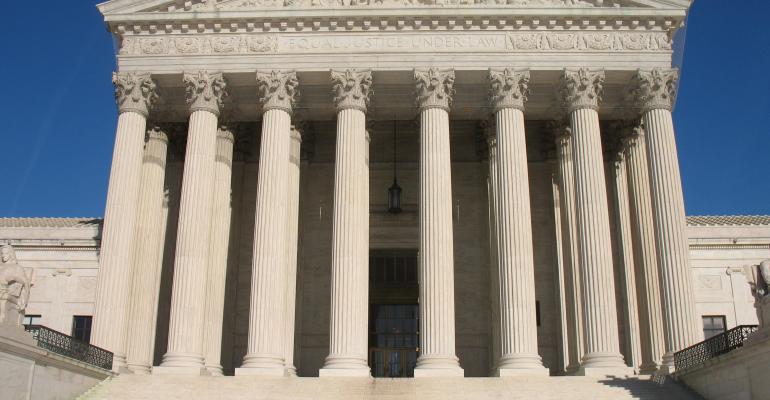A recent U.S. Supreme Court ruling provides some much needed guidance on the issue of whether bankruptcy protection is afforded to inherited individual retirement accounts. While the bankruptcy protection afforded to Employee Retirement Income Security Act qualified plans, as well as contributory and rollover IRAs is clear, the protection given to inherited IRAs hadn’t been as well-defined. In Clark, et ux v. Rameker, 573 U. S. ____ (Jun, 12, 2014), the U.S. Supreme Court unanimously held that funds held in inherited IRAs are NOT protected as “retirement funds” within the meaning of Bankruptcy Code Section 522(b)(3)(C) of the federal bankruptcy code.
Bankruptcy Code
Before the Bankruptcy Code was amended in 2005, retirement accounts were governed by either: (1) state exemption law if the state had opted out of the Bankruptcy Code exemptions; or (2) the limited set of Bankruptcy Code exemptions found in 11 U.S.C. Section 522. The Bankruptcy Abuse Prevention and Consumer Protection Act of 2005 (the Act), expanded plans that are protected in bankruptcy cases to include traditional IRAs and Roth IRAs.1 Specifically, the Act provides protection for retirement assets to the extent that they’re in a fund or account that’s exempt from taxation under IRC Sections 401, 403, 408, 408A, 414, 457 or 501(a). Two elements must be present for a retirement account to fall under the 11 U.S.C. Section 522(b)(3)(C) exemption:(1) the amount the debtor seeks to exempt must be retirement funds, and (2) such retirement funds must be in an account that’s exempt from taxation under Internal Revenue Code Sections 401, 403, 408, 408(A), 414, 457 or 501(a).
Prior Court Rulings
The bankruptcy courts have been divided as to whether the Act protects inherited IRAs. Until recently, most courts ruled in favor of the bankruptcy trustee and denied exemptions to inherited IRAs. When holding that an inherited IRA wasn’t exempt from the bankruptcy estate, the bankruptcy courts often found that an inherited IRA was significantly different from an IRA under the IRC.
More recently, however, there had been a strong shift in favor of debtors. In one such case, In re Clark, in which the debtor had an inherited IRA, the bankruptcy court originally found that the trustee had the more persuasive argument by looking at the ordinary meaning of a retirement fund as found in Webster’s dictionary, which defines the term “retirement” as “withdrawal from one’s position or occupation or from active working life.”2 The court concluded that because the funds weren’t held in anticipation of “withdrawal from one’s position or occupation,” the inherited IRA didn’t contain any living person’s “retirement funds.” On appeal, the district court pointed out that the term “retirement funds” applied to any account that contained funds set aside for retirement, so long as the funds had been accumulated for retirement purposes originally and that the Bankruptcy Code doesn’t specify that the funds must be the debtor’s retirement funds. The U.S. Court of Appeals for the Seventh Circuit, however, reversed the district court’s decision, reasoning that an inherited IRA doesn’t have the economic attributes of a retirement vehicle, because the money can’t be held in the account until the current owner’s retirement.
Supreme Court Ruling
To resolve a conflict between the Seventh Circuit’s ruling and the Fifth Circuit’s ruling in In re Chilton,3 the Supreme Court granted certiorari, in Clark on Nov. 26, 2013 and issued its decision on June 12, 2014.
In its decision, the court stated that the ordinary meaning of “retirement funds” is properly understood to be sums of money set aside for the day an individual stops working. The court found that the following three legal characteristics of inherited IRAs provide objective evidence that they don’t contain such funds:
- The holder of an inherited IRA may never invest additional money in the account.
- Holders of inherited IRAs are required to withdraw money from the accounts, no matter how far they are from retirement.
- The holder of an inherited IRA may withdraw the entire balance of the account at anytime—and use it for any purpose—without penalty.
The court reasoned that allowing debtors to protect funds in traditional and Roth IRAs ensures that debtors will be able to meet their basic needs during their retirement years, but that nothing about an inherited IRA’s legal characteristics prevent or discourage an individual from using the entire balance immediately after bankruptcy for purposes of current consumption. The court rejected the debtor’s claim that funds in an inherited IRA are retirement funds because they were originally set aside for retirement finding the debtor’s interpretation of that term conflicts with ordinary usage of the term “retirement funds” and would render the term “retirement funds,” as used in this context, superfluous
Qualified Trust
With this decision favoring creditors, it’s more important than ever to discuss with clients the option of having an IRA payable to a qualified trust for the benefit of the individual beneficiary. Doing so will provide the beneficiary with much stronger asset protection compared designating the individual as an IRA’s outright beneficiary.4 Such trust should be drafted to qualify as a designated beneficiary under the IRC Section 401(a)(9) regulations.
Endnotes
1. Public Law 109-8.
2. In re Clark, 109 A.F.T.R.2d 2012-733 (466 B.R. 135).
3. In re Chilton, 674 F. 3d 486 (2012).
4. If a state has a specific provision that exempts inherited IRAs from a bankruptcy estate, it’s assumed that such protection will still be available to residents of such states.
The author acknowledges and thanks Michael J. Jones, a partner at Thompson Jones LLP in Monterey Calif., and Thomas C. Foster, director at McCandish Holton PC in Richmond, Va., for their review and edits of this article.





